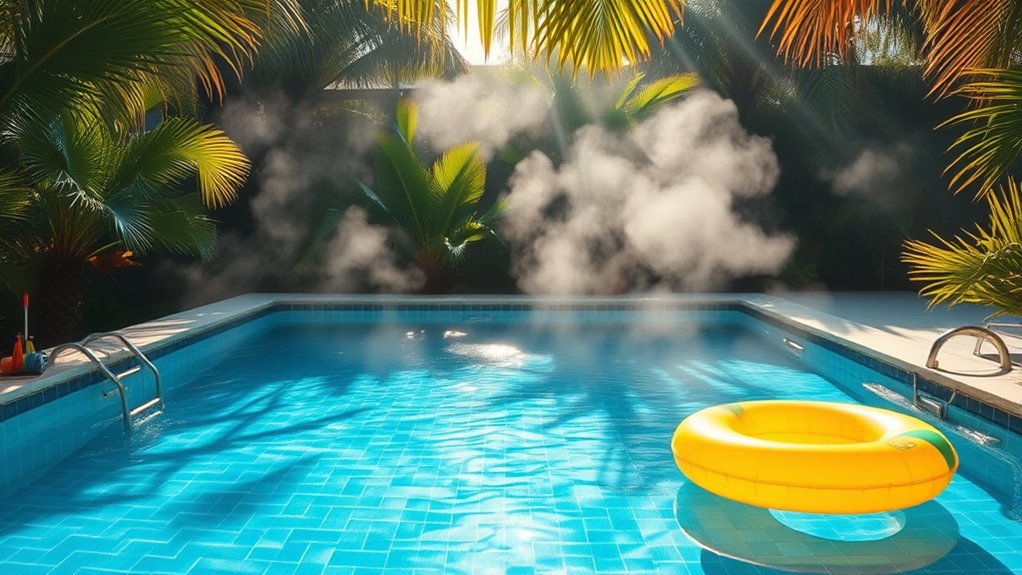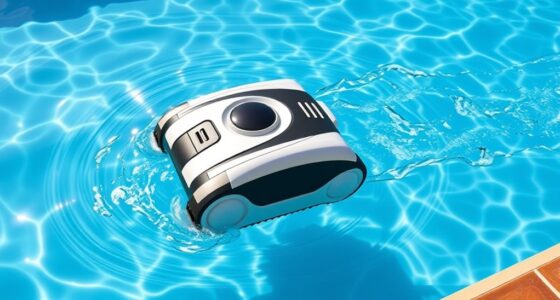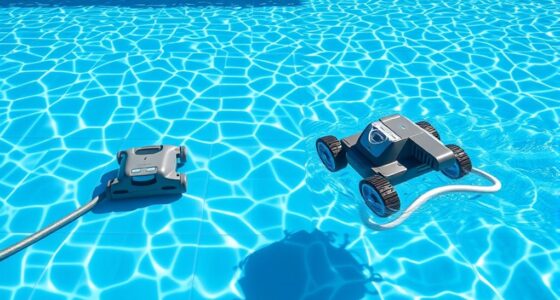In warm climates, you can keep your pool in top shape during winter by maintaining chemical balance, regularly inspecting equipment, and using a quality cover to prevent debris buildup and water evaporation. Running your pump periodically ensures good water circulation and prevents stagnation. Solar heating can help keep water comfortable without high energy costs. For more expert tips on off-season pool care, stay with us to discover how to simplify winter maintenance.
Key Takeaways
- Use solar pool covers to retain heat and reduce evaporation during off-season months.
- Maintain regular chemical checks to prevent algae growth and water imbalance.
- Inspect and clean pool equipment, ensuring pumps and filters are functioning properly for year-round use.
- Use solar panels to keep the water comfortably warm without high energy costs.
- Remove debris and conduct periodic water surface inspections to keep the pool clean and balanced.

Even in warm climates, winter can bring unique challenges to maintaining your pool. While you might think that warm weather means you can leave your pool unattended, the cooler months can still impact water quality and equipment longevity. One effective way to keep your pool in good shape during the off-season is by using solar heating to extend your swimming season and maintain comfortable water temperatures. Solar panels can be installed to harness the sun’s energy, providing a cost-efficient way to keep your pool warm without increasing energy bills. Even when temperatures drop, solar heating can help guarantee your pool remains inviting, especially if you enjoy occasional dips during the winter months.
Another vital component of winter pool care is the use of pool covers. A high-quality cover acts as a barrier against debris, dirt, and leaves that can accumulate during the off-season, reducing the amount of cleaning you’ll need to do once warmer weather returns. It also helps to prevent water evaporation, which can be significant even in cooler temperatures, saving you on water costs and maintaining water levels more easily. Additionally, pool covers help to keep the water temperature stable, especially if you’ve invested in solar heating. By trapping heat, covers make it easier to maintain a comfortable temperature and reduce the workload on your heating system.
Using a high-quality pool cover reduces debris, prevents evaporation, and stabilizes water temperature during winter.
During winter, you should regularly check your pool’s chemical levels, even if you’re not swimming frequently. Maintaining proper pH, alkalinity, and sanitizer levels prevents algae growth and keeps the water balanced. Skipping these steps can lead to more difficult cleaning when you’re ready to swim again. Use a test kit to regularly monitor the water, and adjust chemicals as needed. If your pool has a cover, remove it periodically to inspect the water surface for debris or algae growth, then clean and rebalance the water before replacing the cover.
Equipment maintenance is equally important. Winter is the ideal time to inspect your pool pump, filter, and other components for wear and tear. Run the pump periodically to ensure it’s functioning properly and to circulate the water, which helps prevent stagnation and algae buildup. Keep an eye out for leaks or corrosion, and address any issues promptly to avoid costly repairs in the spring. Additionally, understanding personal development tools like goal setting and self-reflection can help you stay motivated to perform regular maintenance tasks and enjoy your pool year-round. By taking these simple steps — utilizing solar heating, investing in a good pool cover, maintaining chemical balance, and inspecting equipment — you’ll guarantee your pool stays in excellent condition all winter long, ready for enjoyable swimming once the weather warms up again.
Frequently Asked Questions
How Often Should I Check My Pool During Winter?
You should check your pool at least once a week during winter. During these visits, focus on maintaining the chemical balance and inspecting your equipment. Regular testing guarantees your pool stays clean and safe, preventing algae growth or damage. Don’t forget to adjust chemicals as needed and look for any signs of leaks or equipment issues. Consistent attention keeps your pool in good shape until you’re ready to swim again.
Can I Leave My Pool Cover on All Winter?
Ever wonder if leaving your winter cover on all season is a good idea? It might seem simple, but it’s vital for pool insulation and preventing debris buildup. While a winter cover protects your pool, keeping it on year-round can trap moisture and cause algae growth. Regularly check your cover, and make sure it’s secure. Proper off-season care keeps your pool in top shape, even in warm climates.
What Are Signs of Winter Damage to My Pool?
You can spot winter damage by checking for torn or sagging pool covers, which indicates wear or debris buildup. Look for cracks or discoloration in the pool surface, and verify your winter chemical balance is maintained to prevent algae or corrosion. Regular pool cover maintenance and monitoring water levels help prevent damage and keep your pool in good shape through the season. If you notice issues, address them promptly to avoid costly repairs.
Should I Heat My Pool During Winter?
You might consider heating your pool during winter to extend your swimming season or prevent freezing. Look into pool heating options like solar heaters, heat pumps, or gas heaters, which suit different budgets and needs. To maximize efficiency, add winter pool insulation, like pool covers or foam boards, to retain heat. If your climate stays mild, heating may not be necessary, but it depends on your comfort and use.
How Do I Prevent Algae Growth in Winter?
Imagine your pool turning into an algae jungle during winter—sounds like a fun rainforest, right? To prevent that, you need to master algae prevention with proper winter chemical balance. Keep the pH and sanitizer levels steady, and don’t forget to shock the pool if needed. Regularly run the pump and brush the walls. This way, your pool stays pristine, not a swampy green mess, all winter long.
Conclusion
Even in warm climates, winter pool care is essential to keep your pool ready for when the weather warms up again. Don’t let the off-season slip by unnoticed—regular maintenance prevents costly repairs later. You might think it’s unnecessary, but a little effort now saves you money and hassle later. Stay proactive with simple tasks like cleaning and chemical balancing, so your pool stays in top shape. Enjoy a pristine pool whenever you’re ready to dive back in!










